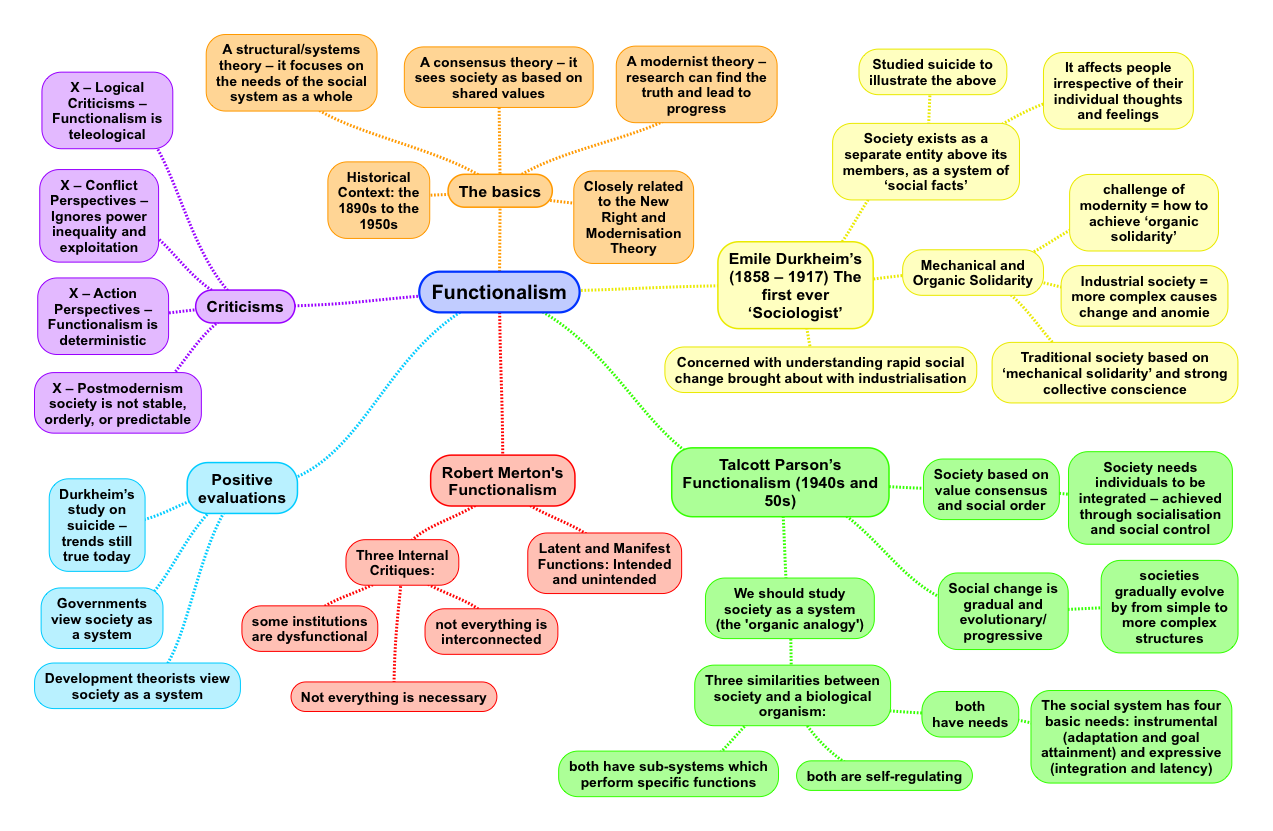Have you ever wondered why societies function the way they do? Why do we have laws, education systems, and religious institutions? The answer lies in the realm of sociology, and more specifically, in the theories put forth by functionalist thinkers. Functionalism, a major school of thought in sociology, seeks to understand how societies work by examining the roles and functions of different social institutions.

Image: coggle.it
Functionalist theorists see society as a complex system, much like a living organism, where each part contributes to the overall functioning and stability of the whole. From the family unit to the government, each social institution plays a crucial role in maintaining order and ensuring the well-being of the entire society. Understanding functionalism can help us gain insights into the interconnectedness of different social structures and how they influence our individual lives.
The Origins of Functionalism:
The roots of functionalism can be traced back to the works of 19th-century sociologists like Herbert Spencer, who drew inspiration from biological concepts like evolution and adaptation. Spencer argued that societies, like organisms, evolve over time through a process of natural selection. The fittest societies, those with the most efficient social structures, are more likely to survive and thrive.
However, it was Émile Durkheim, a French sociologist, who is widely considered the founding father of functionalism. In his seminal work, “The Division of Labor in Society,” Durkheim argued that social solidarity is essential for a society to function effectively. He identified two types of solidarity: mechanical solidarity, found in traditional societies with strong shared beliefs and values, and organic solidarity, found in more complex, modern societies where individuals are interdependent due to specialization.
Key Concepts in Functionalism:
Functionalism is built on a set of core concepts that shape its perspective on society. These concepts include:
1. Social Structures
Functionalist theorists see society as a system of interconnected social structures. These structures, like the family, education system, religion, economy, and government, perform specific functions that contribute to the overall stability of society.

Image: revisesociology.com
2. Social Functions
“Functions” in functionalism refer to the positive contributions that social structures make to the maintenance and stability of the social system. For example, the education system functions to socialize individuals into society’s norms and values, prepare them for future employment, and transmit knowledge and skills.
3. Dysfunctions
Not all social structures function smoothly, and some may even have negative consequences for society. Functionalist theorists refer to these negative consequences as “dysfunctions.” For example, poverty can be seen as a dysfunction that undermines social stability and increases crime rates.
4. Manifest and Latent Functions
Functionalist theorists also distinguish between manifest and latent functions. Manifest functions are the intended and recognized consequences of social structures, while latent functions are unintended and often unrecognized consequences. For example, a manifest function of education is to transmit knowledge, while a latent function could be the creation of social networks among students.
Functionalism in Action: Real-World Applications
Functionalism has had a significant impact on understanding social phenomena across various disciplines, including sociology, anthropology, and psychology. Here are some real-world applications of functionalist theory:
1. Understanding Social Change
Functionalist theories can help us understand how societies change over time. When social structures fail to perform their functions effectively, it creates tensions and pressures that can lead to social change. For example, the rise of the civil rights movement in the United States can be partially explained by the dysfunction of existing social structures in perpetuating racial inequality.
2. Analyzing Social Institutions
Functionalist theories provide a useful framework for analyzing the roles and functions of various social institutions, such as the family, education system, religion, and economy. By examining the ways in which these institutions contribute to the stability and functioning of society, we can gain insights into social processes and dynamics.
3. Explaining Social Problems
Functionalist theories can also help us understand social problems, such as poverty, crime, and drug abuse. By identifying the dysfunctions of existing social structures that contribute to these problems, we can develop effective social policies and interventions to address them.
Criticisms of Functionalism
Despite its influence, functionalism has also faced criticism from other schools of thought in sociology. Some of the key criticisms include:
1. Conservative Bias
One of the major criticisms is that functionalism tends to be conservative in its outlook. It tends to downplay or ignore the potential for conflict and social change. By emphasizing the stability of society, functionalism may inadvertently legitimize existing social inequalities and power structures.
2. Oversimplification
Functionalists are often accused of oversimplifying complex social processes. By focusing on the functions of social institutions, they may overlook the individual motivations, experiences, and struggles that shape social reality.
3. Lack of Agency
Functionalism is also criticized for its lack of focus on individual agency. Individuals are seen as passive recipients of the influence of social structures, with little room for individual action and change.
Contemporary Functionalism
While functionalism has been challenged over the years, it remains an influential theoretical perspective in sociology. In recent decades, contemporary functionalist thinkers have attempted to address some of the criticisms by integrating concepts from other sociological theories, such as conflict theory and symbolic interactionism.
One notable example is the work of Robert Merton, who developed the concept of “middle-range theories,” advocating for more empirical research and nuanced analyses of social phenomena. Merton also recognized that social structures can have both manifest and latent functions, highlighting the complexity and unintended consequences of social processes.
Functionalism Theorists
Conclusion:
Understanding functionalism theorists is crucial for grasping the dynamics of social systems. This theoretical framework provides valuable insights into the interconnectedness of social structures, the functions they perform, and their potential dysfunctions. Though functionalism has its limitations, it continues to be a valuable tool for analyzing social problems and understanding social change. By delving deeper into this theory, we can gain a better understanding of how society operates and work towards creating a more just and equitable world.





